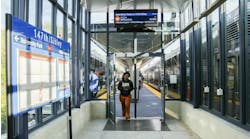Mayor Rob Ford supports a public-private partnership to build the Eglinton LRT. But transit advocates worry about higher fares and more complicated commutes if the private sector ends up running the line, too.
Ford believes the TTC should get out of the construction business and focus on service delivery, his policy advisor told reporters on Wednesday.
"The mayor thinks the minister (of transportation) has been a quick study on the file. He's on the same wavelength," said Mark Towhey.
But former TTC vice-chair Joe Mihevc said "balkanizing" Toronto transit "will serve no one."
The comments follow a Star report that Metrolinx is considering a public-private partnership to build the $8.2 billion provincially funded Eglinton-Scarborough Crosstown LRT.
The TTC doesn't want to run a project designed and constructed by the private sector, say Star sources. That means Eglinton could also be operated and maintained by an outside provider.
A Metrolinx decision is still pending. But Queen's Park says its Infrastructure Ontario procurement agency has proved that Alternative Financing and Procurement (AFP) brings projects in on time and on budget. AFPs, also known as P3s, involve a private-sector partner assuming the risk of design and construction shortfalls in public projects such as hospitals, courthouses and transit, in return for a profit.
Proponents typically point to Vancouver's Canada Line, operated by SNC Lavalin, as a public-private project that was successfully integrated with public transit.
Public-private partnerships are frequently confused with privatization, said one provincial expert.
"In the same way we do with a hospital, where the private sector partner doesn't have to market the hospital to get more patients in to get more money, (under an AFP, the transit partner must) make sure the project is done on-time and on-budget and live up to performance requirements," the source said.
Depending on the long-term contract, a rail operator would get paid for service based on performance requirements such as the cleanliness of stations or on-time performance, said the expert.
AFP opponents point to London, England, and Melbourne, Australia, as examples where privatized transit became a disaster. Because public transit always loses money, they fear riders and taxpayers will have to ante up so the private company gets its profit.
"It's a potential huge risk for transit riders. Will people be able to transfer? Will the fare be higher?" said Jamie Kirkpatrick, of the TTCriders group.
He said the Canada Line has sucked resources out of Vancouver's bus system.
If Metrolinx runs the Eglinton line, will it charge higher fares like those on GO Transit, he wonders.
Some construction unions support AFPs if they're the only way a project will be built, said Toronto and York Region Labour Council president John Cartwright.
"The entire rest of the labour movement says P3s cost more and deliver less," he said.
One has only to look at the now six-week-old transit strike in York Region, where private companies operate the region's buses, paying drivers about $7 an hour less than other area transit agencies, he said.
The politicians dropped the ball in negotiating those contracts, Cartwright said. Sure, the companies aren't getting paid during the strike, "but why isn't there a penalty to these guys for not delivering service to the people of York Region?"
"It is a travesty that we went from a fully funded, shovel-ready transit expansion plan (Transit City) to the equivalent of a Highway 407 through the heart of the city," said Councillor Maria Augimeri, who sits on the TTC board.
Copyright 2008 LexisNexis, a division of Reed Elsevier Inc. All rights reserved.
Terms and Conditions |Privacy Policy

